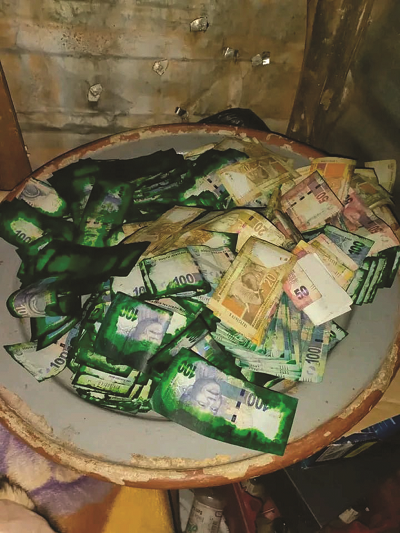By Thoboloko Nts’onyane
MASERU – Lesotho citizen is among the suspects caught in South Africa in connection to the auto-teller machine (ATM) bombings, the South African Police Service (SAPS) has reported.
This comes following the circulation of dyed South African banknotes in the country which are said to be the proceeds of crime.
“Three suspects possibly linked to ATM bombings in and around Gauteng have been arrested by SAPS Tactical Response Teams (TRT) this morning in Tembisa, Gauteng.
In their possession, police found dye-stained money, explosives as well as four firearms and ammunition.
“Police were following up on intelligence driven information when they identified the first suspect. The 44-year-old South African national was cornered and his vehicle searched. Dye-stained money was found in the boot of his vehicle.
“Two more suspects, a Lesotho national aged 35-years of age and a 28-year-old Mozambican national were both arrested at a house in the same area. They too were found with dye-stained money as well as unlicensed firearms and ammunition as well as explosives,” reads the SAPS statement.
According to SAPS the suspects have appeared before the Magistrates’ Court on Monday earlier this week.
They face numerous charges including being in possession of dye-stained money, possession of unlicensed firearms and ammunition and the illegal possession of explosives.
Following a spate of reports that there are dye-stained South Africa banknotes in circulation, the Central Bank of Lesotho (CBL) has issued a statement warning against acceptance of such notes.
These stained banknotes are reported as proceeds of crime by the bank.
“The public is cautioned about the prevalence of dye-stained/bleached banknotes. The dye-stained/bleached banknotes is believed to be resulting from a spate of riots which culminated in the bombing of many ATMs in the KwaZulu-Natal Province, Republic of South Africa (RSA).
“In addition, the recent bombing and interception of Cash in transit (CIT) trucks in RSA may be another contributing factor,” reads the CBL statement.
ATMs are said to hold cash in specialised containers that store ink as a security measure.
Meanwhile there are fears that this could affect money circulation in the country.
It has further cautioned the members of the public that the bleached ink is not easily visible through the naked eye saying it is visible under ultraviolet light (UV) and other sophisticated cash processing equipment.
CBL further cautions: “The public is notified that the bleached Rand banknotes will not be exchanged for value at the banks and Central Bank of Lesotho”
As a result of their circulation, CBL reports that some banks, retailers and members of the public have fallen prey thereby suffering losses because of bleached banknotes.
“The public is, therefore, warned against accepting and using dye-stained/bleached Rand banknotes in circulation as a means of payment because this security ink renders them unusable and worthless. The public is also urged to remain vigilant while the Bank works tirelessly with the South African Reserve Bank (SARB) to find mitigating solutions to address the challenge.”
Recently, the Ministers of Police of Lesotho and South Africa, Hon Lebona Lephema and Hon Bheki Cele have signed a memorandum of understanding (MoU) to combat the cross-border crimes.


